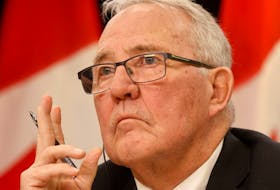Don’t think of it as a cyber militarization test by the Russian government.
Think of it as a tacit admission.

Last week in this space, I wrote about the difficulties of trying to limit the wired world’s reach into my own time, life and even mood.
This week, I’m thinking about the difficulties of a different kind of internet limitation.
A much more abrupt one.
Sometime soon, maybe within days, but apparently before April Fool’s Day, the Russian government is planning to run a test on closing its gates to the internet.
The country wants to ensure that it can operate a Russian internet in isolation from the rest of the world wide web, a little like running a home network instead of using public Wi-Fi. (OK, I admit, that’s really simplistic.)
Think about it: Russia, accused of tampering with democratic elections in several countries through internet attacks, is looking at ways to protect itself from — the internet.
Russia brought in legislation last year — and funding — to put a system in place that would allow a sort of intranet to continue to operate inside its borders, while dropping all contact to the outside-of-Russia internet.
There are differing reasons for the effort — on the one hand, there are suggestions that the Russian government wants to impose overall control inside its borders to limit what its citizens can see (a kind of China-like firewall system), while others believe that the Russian government wants to be sure that it can continue to operate an internal internet in the event that some sort of sanctions cut off access to the rest of the world.
Turns out, there are dangers to inviting everyone in the world into your home office, whether you’re a senior who just wants to play a few internet slot machines or a global power trying to keep control over your own citizens.
Think about it: Russia, accused of tampering with democratic elections in several countries through internet attacks, is looking at ways to protect itself from — the internet.
And what better way is there to admit that there’s a clear and present danger from the internet than to look at ways to protect yourself from it?
But while the solution may seem clear to the Russian government, it’s far less clear for everyone else — because open doors have their place, too.
While it may be a clear danger to democracy to have open doors around the world, it’s even more dangerous to have places where those doors can be firmly shut.
Information powers change — whether it’s the struggles of the Arab Spring or any other place where the reach of the internet, either through formal or informal means, shares crucial facts. Turning off the global nature of the internet is a clear echo of controls over media — and the creation of state media — in totalitarian states.
Control the medium, and you control the message.
The last U.S. presidential election — and the French general election, and the last German election, and probably the upcoming Canadian federal election as well — have all shown how powerful tampering with even something basic as social media can be.
There have also been even more serious efforts at tampering, including attempts to seize control of parts of the U.S. electrical system, along with successful cyber-triggered blackouts in the Ukraine.
Building systems that allow those doors to be closed tight is a clear admission that self-preservation means keeping the enemy out, even when it’s the cyber-enemy.
And what better way to be convinced of that than by being the very cyber-enemy that you’re now taking pains to protect yourself from?
It’s like the computer version of “physician, heal thyself.”
And Russia clearly believes it’s in need of a particularly drastic cure.
That’s not good news for everyone else.
Recent columns by this author
RUSSELL WANGERSKY: Life, unplugged
RUSSELL WANGERSKY: Convenience vs security in the internet of things
Russell Wangersky’s column appears in 36 SaltWire newspapers and websites in Atlantic Canada. He can be reached at [email protected] — Twitter: @wangersky









